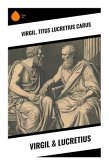Ovid's "Ars Amatoria; or, The Art of Love" is a provocative and innovative poetic treatise that offers a blend of elegiac couplets and sophisticated wit. Composed during the height of the Roman Empire, this work functions not merely as a manual of seduction, but as a meta-commentary on love itself, masterfully intertwining instructional verses with playful satire. Ovid's dexterous command of language allows him to explore various dimensions of romantic pursuit, all while employing allegorical frameworks and vivid imagery that vividly delineates the whimsical nature of desire and courtship in ancient Rome. Originally Publius Ovidius Naso, Ovid was born in 43 BCE to a wealthy family, which afforded him a thorough education in rhetoric and philosophy. His personal experiences with love, exile, and the complexities of human relationships undoubtedly influenced his creative output. Ovid's life, marked by political intrigue and the eventual banishment from Rome, infuses "Ars Amatoria" with a nuanced understanding of love's transient joys and inevitable sorrows, positioning him as one of antiquity's most compelling voices on intimacy. For readers interested in the literary foundations of romantic thought and the complexities of desire, "Ars Amatoria" is indispensable. Ovid's timeless insights on love present a refreshing counterpoint to contemporary discourse, offering both amusement and profound reflection. Engaging, provocative, and rich in cultural context, this text remains an essential read for anyone seeking a deeper understanding of love's art in both ancient and modern frameworks.
Bitte wählen Sie Ihr Anliegen aus.
Rechnungen
Retourenschein anfordern
Bestellstatus
Storno








